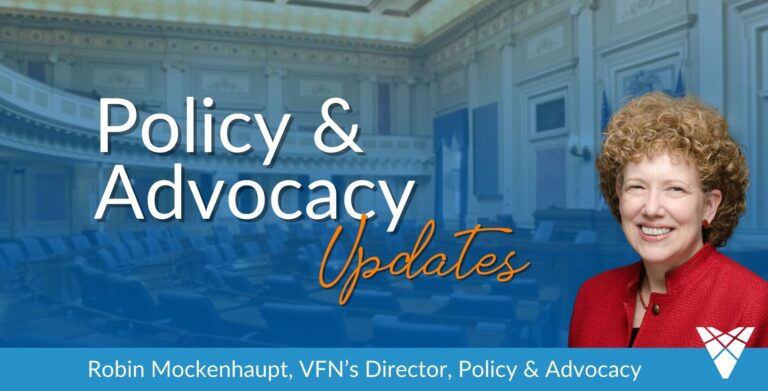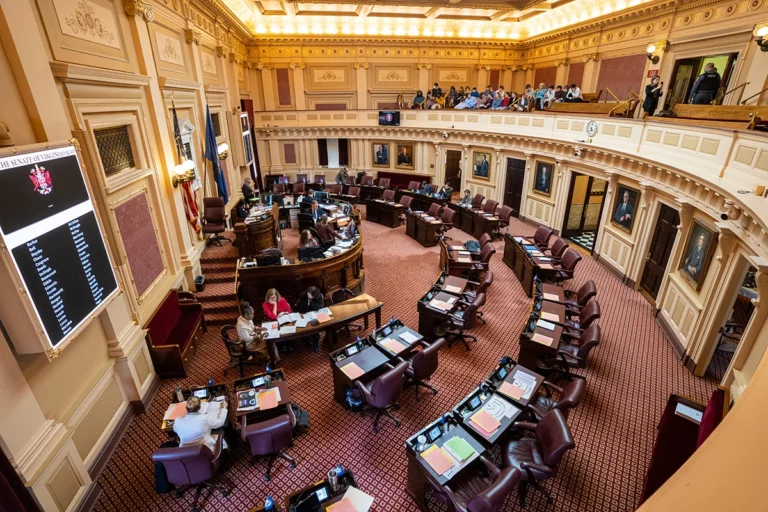A blog post by Robin Mockenhaupt, VFN’s Director, Policy & Advocacy

General Assembly Updates
There are two weeks left in the 2025 Virginia General Assembly (GA) session. It is scheduled to adjourn on February 22, and Governor Youngkin has until March 24 to act on legislation that was passed by the House of Delegates and Senate. Last Thursday, the Senate and House of Delegates passed separate plans for amending the two-year state budget, which will be followed by negotiations with the Governor.
The Commonwealth Institute (TCI) has released its side-by-side budget comparison. This provides a summary-level assessment of key general fund changes proposed by the money committees and Gov. Youngkin compared to the current budget. This chart provides a summary level assessment of key general fund changes proposed by the governor compared to the current budget.
Here are a few issues that we are tracking and might be of interest to your communities:
Federal Changes impacting Virginia
House Speaker Don Scott, D-Portsmouth, last Tuesday evening announced the formation of an Emergency Committee on the Impacts of Federal Workforce and Funding Reductions, a bipartisan panel tasked with assessing the economic fallout and crafting solutions to protect the commonwealth.
Medicaid
Since Virginia expanded its Medicaid program in 2018, the federal government has covered 90% of the costs for newly eligible enrollees, while the remaining 10% has been funded by the state’s private acute-care hospitals. Virginia’s Medicaid expansion included a “trigger” provision, meaning that if federal funding levels were altered, the state could be forced to scale back or eliminate coverage for those who rely on it. Here’s an article that explains more about what this might mean.

Earned Income Tax Credit (EITC)
The EITC helps low- to moderate-income workers and families get a tax break. Both the House and Senate included a proposal to make the credit refundable up to 20% of federal credit. A married couple making $30,000 a year with two kids filing their taxes this year gets $700 back with the 15% option. With an increased refundable credit, they could see just over $1,000 back after taxes.
Update on Previous Highlighted Bills
HB 2397 Virginia Growth and Opportunity Act; eligibility for grants. Expands eligibility for regional councils to receive Virginia Growth and Opportunity Grants.
Passed House, referred to Senate Committee on Finance and Appropriations. Now in Senate. Assigned to a committee.
HB 1701 Income tax; housing opportunity tax credit; sunset extended. Extends the housing opportunity tax credit sunset date from taxable year 2025 to taxable year 2030.
Passed House, referred to Senate Committee on Finance and Appropriations.
HB 1928 Minimum wage. Increases the minimum wage incrementally to $15.00 per hour by January 1, 2027.
Passed House, referred to Senate Committee on Commerce and Labor.
SB 782 Income tax; deductions and earned income tax credit; sunset. Removes the current January 1, 2026 expiration date for the standard deduction in the amount of $8,500 for single individuals and $17,000 for married individuals.
Failed in Senate. Both House Appropriations and Senate Finance and Appropriations Committee budget reports contain language addressing standard deduction.
HB 1879 Department of Housing and Community Development; rental assistance pilot program. Establishes the rental assistance pilot program within the Department of Housing and Community Development for the purpose of providing monthly rental assistance to qualifying households, as defined by the bill. Failed in House, but Senate Finance and Appropriations Budget Report included $15M.